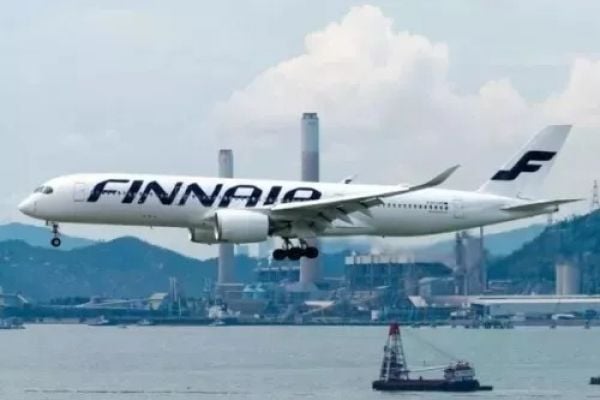The Russian government will on Thursday 14 April discuss giving subsidies to airlines and airports to help them cope with the economic damage caused by western sanctions, Interfax news agency has said.
Details
Airlines will be able to receive compensation for lost revenues stemming from forced flight cancellations while the state will support 11 airports in central and southern Russia, Interfax said.
The sanctions have banned the supply of spare parts to Russian airlines, making maintenance more complicated.
Airbus Urges European Leaders To Refrain From Russian Titanium Sanctions
The above news follows news that Airbus AIR.PA urged Europe on Tuesday 12 April not to block imports of titanium from Russia, saying sanctions on the strategic metal would damage aerospace while barely hurting Russia's economy.
Widening the action taken after Russia's invasion of Ukraine to titanium, used in airplanes and jet engines, would "not be appropriate," chief executive Guillaume Faury said at an annual shareholder meeting.
Ukrainian President Volodymyr Zelenskiy has repeatedly called on western governments to impose stronger economic sanctions on Russia.
The European Union said on Monday more sanctions were an option and British Prime Minister Boris Johnson said on Saturday 9 April that Kyiv's allies would continue to tighten pressure on Moscow.
Russia is the largest producer of titanium, a strategic metal prized for its strength relative to its weight.
The EU has so far avoided banning Russian commodities other than steel and coal, and titanium remains exempt from restrictions on trade with Russia.
"Airbus is applying and will continue to apply the sanctions fully," a company spokesperson said.
"Sanctions on Russian titanium would hardly harm Russia, because they only account for a small part of export revenues there. But they would massively damage the entire aerospace industry across Europe," the spokesperson added.
Airbus is accelerating a search for non-Russian supplies in the long term, while its needs are covered in the short and medium term, Faury said.
In March, Airbus said it "is directly sourcing titanium from Russia as well as from other countries" and indirectly acquiring Russian titanium via suppliers.
On Tuesday 12 April, it reaffirmed this in answer to a Reuters query but declined to say when it had last received Russian titanium.
Outlook Confirmed
Airbus has said it relies on Russia for half its titanium needs, while state-backed VSMPO-AVISMA VSMO.MM provided a third of Boeing's needs under a deal renewed last November. Last month, Boeing said it had suspended buying Russian titanium.
VSMPO-AVISMA is 25%-owned by state defence conglomerate Rostec. It relies on aerospace for three quarters of its sales.
Aerospace officials say Airbus is partly concerned about the reliance on Russia at suppliers like France's Safran SAF.PA, which uses titanium to make jet engine parts and landing gear.
Safran said in February that it had reserves for several months and depended on Russia for less than half its needs. It did not immediately respond to a request for comment on whether it shared Airbus' worries about possible sanctions.
Aerospace is not the only industry wrestling with Russia's commodity clout. US utilities have lobbied the White House not to ban Russian uranium, Reuters reported last month.
More than 400 companies have withdrawn from Russia since war started on 24 February, according to researchers. Approximately 80 have kept a presence, while suspending new investments.
Faury reaffirmed Airbus' 2022 profit guidance but said that it was clear the war in Ukraine was "making it harder as we now have a more challenging risk profile" due to economic risks.
"That being said, we still have three quarters ahead of us and we continue to believe we can achieve it," he said.
Boeing Says 141 Jet Orders In Limbo Amid War In Ukraine
All of the above news follows news that Boeing Co BA.N on Tuesday 12 April moved orders for 141 of its airplanes into accounting limbo due to the war in Ukraine and international sanctions against Russia, among other contractual issues, meaning it no longer expects the jets to be delivered.
Boeing unveiled the adjustment to its order backlog in monthly orders and deliveries data that also showed it had delivered 41 jets to customers in March.
The monthly deliveries tally included 34 of its cash-cow 737 MAX single-aisle jets, two 767 freighters for FedEx Corp FDX.N and a 777 freighter for China Airlines 2610.TW.
The 41 March deliveries - nearly double the 22 it delivered in February and up from 29 a year ago - reflect rebounding travel and pandemic-driven cargo demand. Boeing said year-to-date deliveries stood at 95 aircraft.
Deliveries of its 787 Dreamliner remained frozen due to inspections and repairs for production flaws.
In March, Boeing booked orders for 53 planes, while customers canceled orders for 15 jets - including three of its 787s. Net of canceled orders and swapped models, Boeing had 38 orders, it said.
For the first three months of the year, Boeing's orders rose to 167 from 114, Boeing said. Taking out cases where customers canceled orders or swapped models, orders stood at 145, up from 107, Boeing reported.
After adjustments for deals deemed unlikely to result in actual delivery, net orders year to date dropped to 76 from 179, Boeing said.
Overall, Boeing's order backlog fell to 4,231 from 4,375.
Boeing said the accounting adjustment included 141 aircraft removed from its backlog for financial and contractual considerations.
Most of the aircraft removed were due to the war in Ukraine, which prompted international sanctions against Russia and ruined Ukraine's airline industry.
The orders were mainly for Russian carriers and included 138 of Boeing's best-selling 737 MAX, and more than a dozen 777 and 787 widebody models.
Jet orders could return to the backlog if Boeing's assessment changes.
Boeing rival Airbus SE AIR.PA said it delivered 142 planes in the first quarter, up more than 13% on the year.
Airbus said that it sold a total of 253 jets in the first quarter, or a net total of 83 after cancellations.
Airbus does not publish a figure comparable to Boeing's accounting adjustment, but industry sources said the European planemaker also has an internal filter for screening out orders that are unlikely to be delivered and does not place them into its production plan.
News by Reuters, edited by Hospitality Ireland. Click subscribe to sign up for the Hospitality Ireland print edition.









